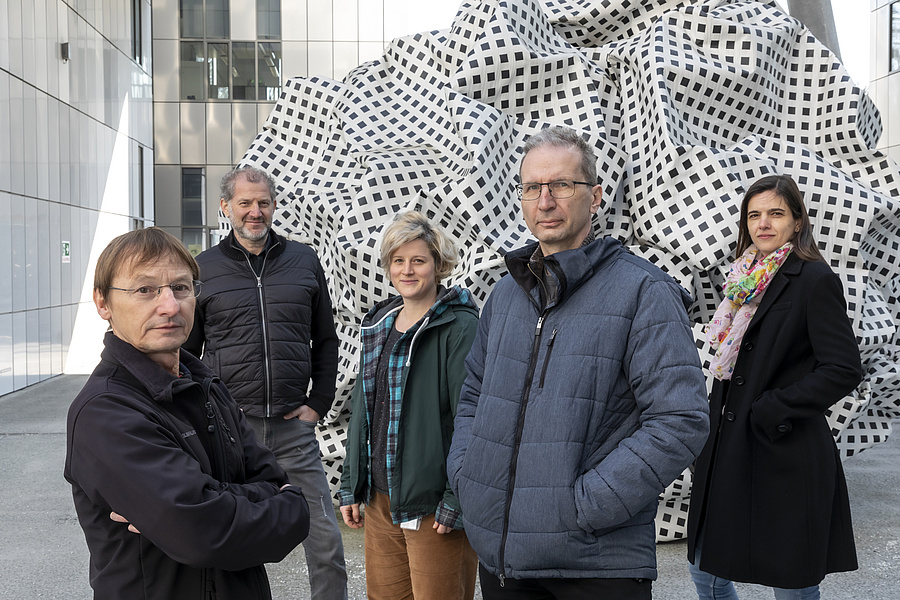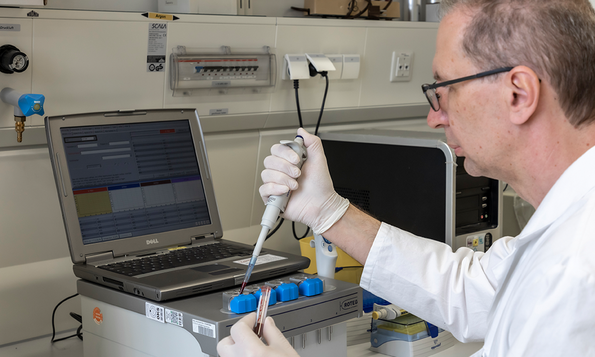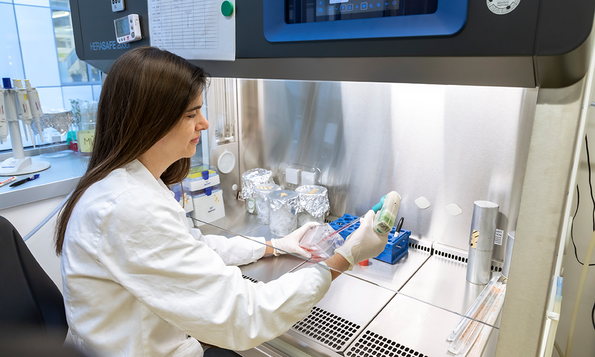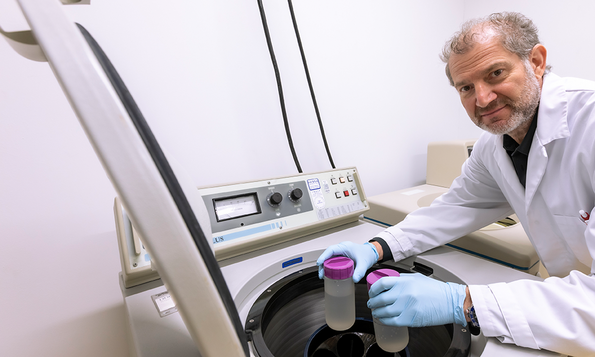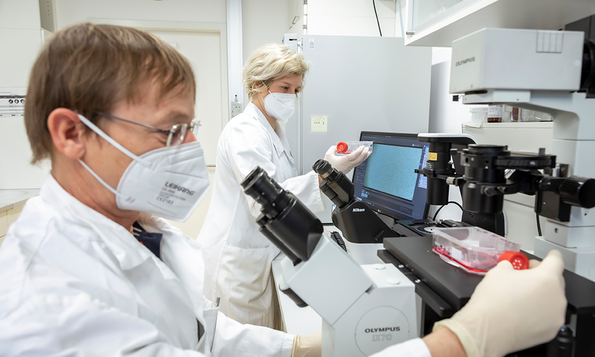- The University
- Studying
-
Research
- Profile
- Infrastructure
- Cooperations
- Services
-
Career
- Med Uni Graz as an Employer
- Educational Opportunities
- Work Environment
- Job openings
-
Health
-
Health Topics
- Health Infrastructure
-
Health Topics
Research team Cvirn
Research focus: Circulation and vascular research
PI: Gerhard Cvirn
Focus: Effects of various drugs and situations on the coagulation system and on the development of endothelial dysfunction and atherosclerosis
Our group pursues intensive research on the influence of antioxidants, anticoagulants, oxidized lipoproteins, and nutritial products on primary and secondary haemostasis. Thrombelastometry, Platelet function, and Thrombin generation are our core technologies. The influence of orthostasis, bed rest, walking exercise, gender, and aging on the coagulation cascade are additional focuses of our interest. Beyond that, we study the development of endothelial dysfunction and atherosclerosis induced by oxidized lipoproteins.
Network: Long-standing collaborations exist with the Division of Physiology, the Department of Paediatrics and Adolescent Medicine, the Department of Neurology, the Department of Blood Group Serology and Transfusion Medicine, the Center for Medical Research, the Department of Endocrinology and Metabolism, Cardiovascular Diabetology Research Group, and the Clinical Institute of Medical and Chemical Laboratory Diagnostics, all Medical University of Graz.
Projects
Effects of long-term consumption of two plant-based dietary supplements on cardiovascular health and low-grade inflammation in elderly
- In this study, we are exploring whether the long-term separate ingestions of an encapsulated juice powder concentrate and a plant-based omega fatty acid supplement, or a combined ingestion of the two, can affect biomarkers of cardiovascular health, low-grade inflammation, indicators of aging (including cognitive function), respiratory tract symptoms, as well as quality of life in elderly. OUTCOMES: Since the intake of the two nutritional products might exert similar or several different effects, we will assess multiple outcomes. Primary outcomes: Biomarkers of cardiovascular health - Biomarkers of low-grade inflammation. Secondary outcomes: Selected indicators of aging - Upper respiratory tract symptoms - Quality of life. Tertiary outcome: Bioavailability of micronutrients and fatty acids.
- Duration: 2022-2024
- Funded by: Greenbeat-Institut für Nährstoff-Forschung und Sporternährung, Graz
- Project partners: Manfred Lamprecht, Melina Tsiountsioura, Lisa Götz, Seth Hallström, Gerd Hörl, Karl Öttl, Cornelia Ranz, Azra Darko, Gerhard Ledinski, Gerd Kager, Doris Payerl, Erwin Tafeit, Gilbert Reibnegger, Harald Köfeler, Heimo Strohmaier, Wilfried Renner
Orthostatic challenge-induced coagulation activation in young vs. elderly individuals
- The incidence of arterial or venous thrombosis is recognized to increase with aging. However, many elderly people do not experience clinical thrombotic events despite elevated levels of several coagulation markers. It is therefore the aim of our study to examine whether the haemostatic system of elderly people is actually in a hypercoagulable state compared with that of young people. We provoke mild coagulation activation in elderly and young people by applying a sit-to-stand test, a suitable model for orthostatic challenge. Subsequently, we compare the extent of orthostatic challenge-induced coagulation activation in elderly with that in young people.
- Projektdauer: 2020-2023
- Funded by: Medical University of Graz
- Project partners: Axel Schlagenhauf, Harald Haidl, Bianca Brix, Markus Kneihsl, Thomas Gattringer, Martin Koestenberger, Melina Tsiountsioura, Willibald Wonisch, Thomas Wagner, Andreas Rössler, Nandu Goswami
The antiplatelet and antithrombotic action of S-NO-Albumin
- In our research group a novel NO-donor, S-NO-Human Serum Albumin (S-NO-HSA), is at hand having an advantage over other NO-donors available: by virtue of its long-lasting release of NO, S-NO-HSA provides vasodilatatory activity without a decrease in systemic blood pressure, an adverse event associated with the majority of NO-donor agents. In this study we investigate the antiplatelet effects of the novel NO-donor S-NO-HSA. The effects of S-NO-HSA on the platelet function will be analyzed by means of following techniques: i) Platelet aggregation using the impedance method, ii) Thrombelastometry using minute amounts of tissue factor as trigger of coagulation, iii) Platelet adhesion using the Cone and Platelet Analyzer (ImpactR ), iv) Platelet function analyzer 200.
- Duration: 2020-2023
- Funded by: Medical University of Graz
- Project partners: Seth Hallstöm,Axel Schlagenhauf, Martin Köstenberger, Thomas Wagner
Hypercoagulability and cryptogenic stroke
- Patients diagnosed with cryptogenic stroke are in a hypercoagulable state. However,only little is know about the extent and duration of this hypercoagulable state. Therefore, we intend to perform a simple sit-to-stand test with these patients allowing to assess the extent of orthostatic stress induced coagulation activation. The clot formation process will be monitored by using thrombelastometry and platelet function will be assessed by using impedance aggregometry.
- Duration: 2020-2022
- Funded by: Medical University of Graz
- Project partners: Thomas Gattringer, Markus Kneihsl, Nandu Goswami
Effects of various antioxidants on the oxidizability of native Low-density lipoprotein
- Oxidation of Low-density lipoprotein (LDL) and its consequently cytotoxic effects on endothelial cells are central elements in the development of atherosclerosis. It is the aim of our study to investigate whether antioxidants like ethylpyruvate, metformin, or spermidine are capable of suppressing the oxidation of LDL by using a well-established in-vitro model. The degree of oxidation of the lipid part of the LDL particle is assessed by measuring lipid hydroperoxide as well as malone dialdehyde concentrations. We also assess the degree of apoB-modification by measuring relative electrophoretic mobilities and by quantifying oxidation-specific immune epitopes using a fluorescent immunoassay and specific antibodies against oxLDL.
- Duration: ongoing
- Funded by: Medical University of Graz
- Project partners: Azra Darko, Gerd Kager, Angelika Krebs, Gerhard Ledinski, Thomas Wagner



